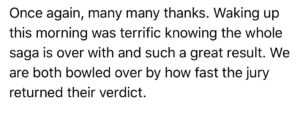Monthly Archives: June 2017

Nottingham crime solicitor Lauren Fisher recently represented a client at a Magistrates’ Court trial. The case was an emotive one because it was alleged that he had assaulted his young son by dragging him from one room to another.
Police attended at the address later in the day following a report by the mother that Lauren’s client was preventing her from leaving the address. This informs police that she saw our client drag the child by his feet earlier in the day. The child confirmed this at the time and there was a visible injury.
Young witness support defence account
The child provided a video statement. Although the child was originally a witness for the prosecution, a review of the video evidence showed that the account given was inconsistent with that of the adult witness.
This final account supported what Lauren’s client said about the incident – the child had been playing with a knife so our client intervened, took the knife and dragged the child away by the hand. As a result there was no unlawful assault.
Lauren took the unusual step of serving this interview on the prosecution so that she could invite the Crown to agree the evidence. As an alternative a hearsay application was served because nobody with care of the child was prepared to allow the child to come to court. Lauren shared the view that the child should not need to be present at court.
Prosecution failure to comply with duty of disclosure
The day before the trial the prosecution had the case listed for a Case Management Hearing. The Crown had failed to comply with its duty of disclosure. Agreement is sought to adjourn the trial in the absence of Magistrates but Lauren did not agree. Her client did not wish further delay in the case so the case was adjourned to the trial date.
On the morning of the trial the prosecution still do not have the information it needed so a further application to adjourn is made. Lauren insisted that the prosecution present a proper chronology of how the Crown had dealt with disclosure.
When the Crown presented the chronology it was clear that the reviewing lawyer had requested information that undermined the credibility of the remaining witness. The lawyer had made the request time and again but it had been ignored by the police.
Eventually the police confirmed that there was such information but still did not pass it to the prosecution but it was not available for the trial.
Prosecution adjournment opposed
The prosecution adjournment was sought on the basis of the public interest in a charge of this nature being heard properly. Lauren opposed the adjournment on the following grounds:
- there was the likelihood from the outset that the witness was not telling the truth
- the child involved confirmed there had been no offence committed
- the proceedings were causing problems for her client before the family court
- summary justice should mean speedy justice so the prosecution and police should not be allowed to ignore the rules
A not guilty verdict was recorded
The District Judge considered the representations and refused the adjournment request. As a result the prosecution were not in a position to proceed and offered no evidence. A not guilty verdict was entered.
Instruct a criminal law specialist

Whether you face police investigation, Magistrates’ Court trial or Crown Court proceedings you will want to instruct a specialist in criminal law who will spend their time trying to secure the best result for you.
If you wish to instruct Nottingham criminal defence solicitor Lauren Fisher then you can telephone her on 0115 9599550 or contact her using the form below.
Contact
Monthly Archives: June 2017

Nottingham crime solicitor advocate Andrew Wesley recently represented a client at trial before Nottingham Crown Court. The allegation was that his client had assaulted a teenager in the street with a stick. Fortunately, the aftermath of the incident was captured in police bodycam footage so the jury acquitted five minutes after retiring.
Client was a victim of anti-social behaviour
The background to the case was that Andrew’s client and his housemate had been subject to anti-social behaviour for eighteen months prior to this allegation. This had involved abuse, threats, damage to property and assaults. Although the police had been involved time and again, they advised our client that there was insufficient evidence to bring any of the culprits to justice.
The day prior to the allegation, both householders had suffered assaults and damage to the fencing of their address. The problems started again on the night of the allegation. The fence was damaged again, youths entered their garden, and threats were made.
As well as calling the police, our client’s housemate went onto the street to try and film those involved. She was hit with a stick so our client had to intervene and pull her back into their house.
The police were called again, but in the meantime a large group had gathered, including the parents of one of the alleged victims of an assault, and further threats were made.
Bodycam Footage captured initial complaint
The crowd dispersed because the police arrived, and our client and his housemate made a complaint. This was captured on bodycam footage. Unknown to them, however, one of the youths had turned matters around and claimed that she was the person assaulted by our client. Two of her friends backed her up in her story.
Andrew’s client elected to have his trial by jury which in this case was a wise choice. Although there were obvious problems with the prosecution case, a choice had been made to proceed.
Evidence before the jury that could not be challenged
Through careful preparation, Andrew was able to rely on evidence that could not be challenged by the prosecution so helping the jury decide that his client was not guilty. This included:
- the 999 call of the housemate that showed the witnesses could not have been telling the truth
- the injuries of the complainant were minor so not consistent with the assault described at all
- footage taken by our client showed the mood of the group after the incident to be threatening and abusive
- police bodycam footage captured the first complaints of our client and his housemate as well as their demeanour.
Both our client and his witness gave evidence well.
Although the prosecution witnesses also came over well before the jury, there was a large amount of evidence that at the very least suggested that they were not telling the truth. The jury took no time at all to come to that conclusion so our client was found not guilty.
Positive client feedback
We have been provided with feedback as to how we dealt with the case from beginning to end. It is particularly pleasing to be able to read comments such as:
 Further, the praise was not dependent upon the outcome for our client:
Further, the praise was not dependent upon the outcome for our client:
Finally, we know the stress that police investigations or court proceedings place on both our clients and other people involved in the case. Our aim is to try and remove as much of that pressure as possible.
Contact a Criminal Law Specialist
This case was prepared from our Ilkeston office by experienced crime solicitor Chris Evans. We are the only firm providing advice and representation under the legal aid scheme in Ilkeston.
You can find your nearest office here but we are able to provide our services nationwide. Alternatively, you can use the form below to contact us.
Contact
Monthly Archives: June 2017
 Experienced Newark crime solicitor Ian Carter recently took time out from his practise to speak with a number of A Level Law students studying at Vision West Notts College.
Experienced Newark crime solicitor Ian Carter recently took time out from his practise to speak with a number of A Level Law students studying at Vision West Notts College.
He had met both teachers and students at the school after manning a stall at the recent Newark careers fair. They were keen for him to visit and give a talk on the ‘real world’ application of their studies.
Real life examples of advice in murder cases
They had begun to study the offence of Murder, and over the years Ian had provided advice and representation at the police station, as well as Magistrates’ Court advocacy and the preparation of cases for Crown Court trial.
Ian spent an hour with two different classes talking about how a solicitor first becomes involved in a case, the type of issues that arise at the police station, whether a client can be bailed, and how the case will then progress through the court process. He was then able to answer questions from the students.
Positive Feedback from Students
The presentations received positive feedback. The students felt that he had made the talk very interesting through his explanations of real cases. Ian provided a good insight into the role of a solicitor and how he fits into other aspects of the legal system. The examples that he gave allowed the students to put the law that they had learned into a real context.
The students admitted that they had been concerned that the presentation would be a little ‘dry’ but in the end, as is often the case, they were ‘hooked’ on the stories behind real cases.
As the course progresses it is hoped that Ian will be able to give further talks to add some colour to the students academic studies.
Contact Ian Carter to discuss similar presentations

If you are involved in education and such a talk might be helpful to your students, whether sitting GCSEs or A Levels, or are in further education, please contact Ian Carter using the form below. We hope to be able to help and can discuss arrangements when we receive your enquiry.
Contact
Monthly Archives: June 2017
Nottingham prison law specialist Irene Tolley finally secured release for a client at his seventh parole review. Irene was introduced to the client at HMP Ranby through recommendations by other inmates in time for the final review. Although he had representation during previous reviews, these had been without success.
Twelve years over tariff
Irene’s client was serving an automatic life sentence. He had been sentenced in 2001 and his tariff was set at five years less the time he had served on remand. His tariff had expired in April 2005 therefore by the time Irene became involved he was more than twelve years over tariff. He had served sixteen years because of problems with his sentence progression.
 Irene receiving instructions then submitted an application for an oral hearing and this application was granted. The panel chair was a retired Crown Court judge and Queen’s Counsel.
Irene receiving instructions then submitted an application for an oral hearing and this application was granted. The panel chair was a retired Crown Court judge and Queen’s Counsel.
Bearing in mind the passage of time Irene’s application on behalf of her client was that he be immediately released. Unfortunately, nobody involved in her client’s assessment was supportive of such a suggestion. This included the offender supervisor, offender manager and prison psychologist.
Although the application had been prepared and submitted in good time, it had not been passed onto the panel chair or offender manager. Directions had been given previously for the offender manager to provide a full risk management plan but this plan had not been prepared. This made matters difficult for the panel because they would have to consider release conditions.
Strong and persuasive arguments
Irene put forward strong and persuasive arguments on behalf of her client in order to try and secure his release:
- he had simply been in custody too long
- he had been let down by the prison system with regard to courses and as a result three years were wasted in terms or progression to release
- there was a real concern that if open conditions were recommended then he may not have a risk assessment within a three month period at that establishment
- his current offender manager would not be able to carry out an assessment because his involvement was to cease
- there was no information as to who the new offender manager would be or when they would be allocated
- as a result there was a realistic possibility that his case would not have moved on any further by the next review date in terms of risk assessment
Despite the fact that there was no risk assessment, the panel were persuaded that Irene’s client should be released into supervised accommodation with only three additional licence conditions.
Irene’s client will no doubt be very pleased with the outcome of the this hearing, and will finally be able to continue with his rehabilitation within the community.
Instruct a prison law specialist

This case demonstrates that having the benefit of a specialist prison law adviser can persuade bodies such as the Parole Board to make decisions that are somewhat unusual.
Contact Nottingham prison law specialist Irene Tolley if you, a family member or friend need the benefit of her advice. She can be contacted by telephone on 0115 9599550 or by post at the Nottingham office. Alternatively you can use the form below.
Contact - Prison Law
Monthly Archives: June 2017
It is now the turn of Chesterfield accredited police station representative Rob Lowe to commit to a challenge for a good cause.
The Thames Path Challenge
On Saturday 9 September 2017 he will be taking on the Thames Path Challenge. Being confident (or just foolhardy) he has opted for the 100km option. This route of just over 62 miles follows the River Thames between Putney Bridge and Henley.
Rob understands that the walk can take anywhere between 20 – 33 hours to complete. He’ll be starting around 9am and walking all day and all night with the odd pit stop along the way. Rob has set a targe to complete the route within 24 hours.
Walking for Weston Park Hospital Cancer Charity
Rob’s chosen charity is the Weston Park Cancer Hospital in Sheffield. A couple of years ago Rob’s aunt and uncle, who are twins, were both diagnosed with different forms of cancer within a few months of each other.
 They both received their radiotherapy and chemotherapy at West Park. Whilst neither of them are completely out of the woods, they are both doing much better now. Rob was very close to them as a child, and remains close now.
They both received their radiotherapy and chemotherapy at West Park. Whilst neither of them are completely out of the woods, they are both doing much better now. Rob was very close to them as a child, and remains close now.
“Giving something back”
Rob says of his motivation “I suppose this is my way of giving something back to them, and that’s why I’m doing it. I also know others who West Park have looked after, and I’d much rather do it for a local charity because whilst you always hope family never need them, it’s nice to know they’re there if they do.”
The walk will be self-funded which means that Rob has paid the cost of the challenge himself. The charity will not be contributing anything towards the walk and therefore, every penny of the sponsorship will go to Weston Park.
Follow the link to donate…
Please give generously!
Monthly Archives: June 2017
Derby prison law solicitor Rosamunde Benn represented a client at adjudication at HMP Stoke Heath. The client then took the time to provide favourable feedback on the representation that she provided him.
Representation at an independent adjudication
Rosamunde’s client had been charged in the prison with using threatening, abusive or insulting words or behaviour contrary to Prison Rule 51, paragraph 20.
Some information from the Howard League for Penal Reform about the use of adjudications since 2010 can be found here.
While attending education her client was alleged to have called the officer a ‘sausage’. He then told the officer to ‘shut up’. He was said to have made a further threat that he would ‘see you on the other side of those gates’. Comment was also made that the teacher was afraid.
Our client denied making any such threats. He was also able to offer a witness to the incident who would support his account. In essence, he claimed that the incident had been blown out of all proportion.
Rosamunde’s client entered a not guilty plea and then the officer gave evidence. Our client then gave his evidence and so did his witness.
The District Judge presiding over the adjudication did not find the charge proved because of the witness evidence. He stated that although he found that the officer had given good evidence, the witness had given credible evidence as well. He could not be sure that our client’s conduct was in breach of the rules so dismissed the charge.
Positive client feedback
At the conclusion of his case, our client took the time to offer positive feedback. The feedback was all the more pleasing because he had not used VHS Fletchers before. He stated ‘I was treated very well and would pass on how great your service is‘. He then said ‘I was very pleased how well you came across. Your advice and demeanour was great’.
When asked whether he had any suggestions that might help improve the level of service that we provide he replied ‘I do not have anything to say. You are by far the best I have used’.
Instruct a Derby prison law solicitor
 If you, a family member or friend require advice about any aspect of prison law then please get in touch with Derby prison law solicitor Rosamunde Benn. She can be contacted by telephone on 01332 546818 or by using the form below.
If you, a family member or friend require advice about any aspect of prison law then please get in touch with Derby prison law solicitor Rosamunde Benn. She can be contacted by telephone on 01332 546818 or by using the form below.
Many aspects of the law remain in the scope of the legal aid scheme so advice will be free. If not we aim to offer affordable fixed fees so that all prisoners have access to professional prison law advice and representation.
Contact - Prison Law






